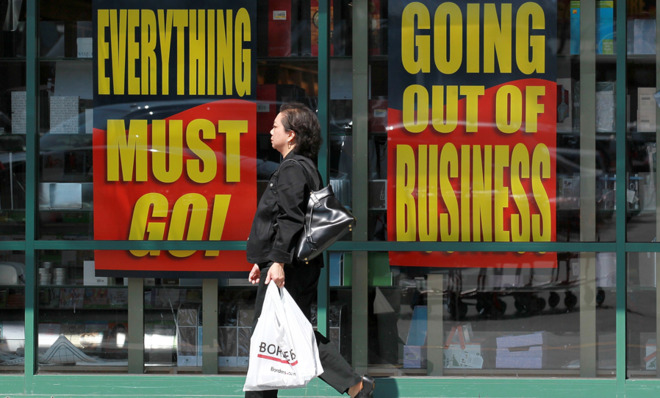How government is killing American entrepreneurship
It's time to embrace startup capitalism and abandon crony capitalism


A free daily email with the biggest news stories of the day – and the best features from TheWeek.com
You are now subscribed
Your newsletter sign-up was successful
America is plagued by mediocre primary schools, subpar infrastructure, and dysfunctional government. But somehow, this country manages to get at least one big, important thing right: innovation.
That's the deep magic of the world's leading economy. But some disturbing trends suggest the nation's competitive edge may vanish if government doesn't embrace startup capitalism rather than crony capitalism.
A new Brookings study finds bad news, both short- and long-term, for U.S. entrepreneurship, a critical driver of innovation. From 2009 through 2011, the deaths of existing businesses outnumbered the births of new ones. Of course, at least some of that trend can be pinned on the Great Recession and Not-So-Great Recovery. So if that was the only worrying stat, perhaps we could dismiss it. But the report's authors also calculate new business formation overall — measured as the share of all businesses less than one year old — has declined by roughly half since 1978.
The Week
Escape your echo chamber. Get the facts behind the news, plus analysis from multiple perspectives.

Sign up for The Week's Free Newsletters
From our morning news briefing to a weekly Good News Newsletter, get the best of The Week delivered directly to your inbox.
From our morning news briefing to a weekly Good News Newsletter, get the best of The Week delivered directly to your inbox.
The Brookings findings, unfortunately, sync with an equally gloomy report from the Kauffman Foundation. Researchers there identified a steep decline over the past decade in the number of tech firms age five and younger — the fast-growing "gazelle" firms that generate a large share of America's innovation and net new job creation. The Kauffman analysis concludes the problem "goes far beyond the more recent effects of the Great Recession." Indeed, GDP and job growth were weak even before the catastrophic downturn.
This is all worrisome for a number of reasons, not the least of which is that it undermines America's vision of itself. National mythology is populated by heroic risk-takers, from Thomas Edison to Henry Ford to Bill Gates to the Google guys.
Of course, not all startups are equally important to U.S. economic vigor. Opening a hair salon may be a smart way for someone without a college degree to climb the ladder. A one-person accounting firm may be a great way to make a living. But neither enterprise has anything close to the economic effects of starting Apple. But fewer startups overall inevitably means fewer new companies that might generate the Next Big Thing and then turn into hugely profitable firms with thousands of well-paid employees.
Just as important, fewer startups means fewer disruptive new competitors to force big business to innovate or die. An economy without sufficient "creative destruction" risks stagnation and decline. That's especially the case when population and labor force growth are slowing, making it harder to grow as fast in the future as in the past. Slower growth means a slower rise in living standards. And if celebrated French economist Thomas Piketty is correct, slower growth also means dramatically more wealth inequality.
A free daily email with the biggest news stories of the day – and the best features from TheWeek.com
Economists are not sure what the problem is. But here is one theory: Government has a big, fat thumb on the scale for incumbent players and their lobbyists — and it's pressing down ever harder. A complex tax and regulatory code are much easier for a big business to handle than a small one. An overly strict patent and copyright regime benefits existing players, not new ones. A "too big to fail" financial system nudges banks to take complex lending risks — the kind that might sink the economy — rather than allocating capital to startups. And burdensome occupational licensing requirements are often more about limiting new entrants than ensuring public safety. Do cosmetologists really need nearly 400 days of training?
Going forward, America will need to be more innovative than ever to keep economic growth rapid. The U.S. economy will need more competitive intensity and dynamism. But that won't happen if big government and big business keep teaming up to prevent the next generation of dynamic competitors from ever existing.
James Pethokoukis is the DeWitt Wallace Fellow at the American Enterprise Institute where he runs the AEIdeas blog. He has also written for The New York Times, National Review, Commentary, The Weekly Standard, and other places.
-
 The environmental cost of GLP-1s
The environmental cost of GLP-1sThe explainer Producing the drugs is a dirty process
-
 Greenland’s capital becomes ground zero for the country’s diplomatic straits
Greenland’s capital becomes ground zero for the country’s diplomatic straitsIN THE SPOTLIGHT A flurry of new consular activity in Nuuk shows how important Greenland has become to Europeans’ anxiety about American imperialism
-
 ‘This is something that happens all too often’
‘This is something that happens all too often’Instant Opinion Opinion, comment and editorials of the day
